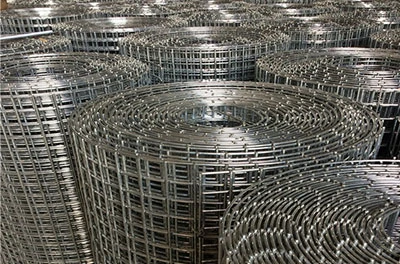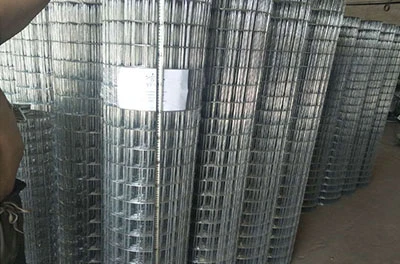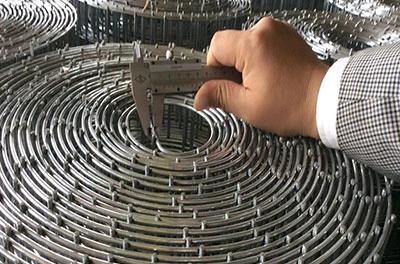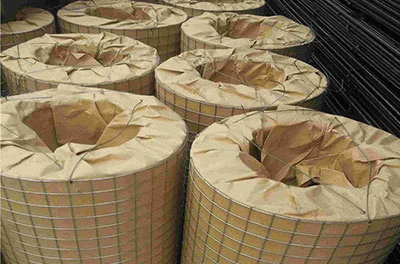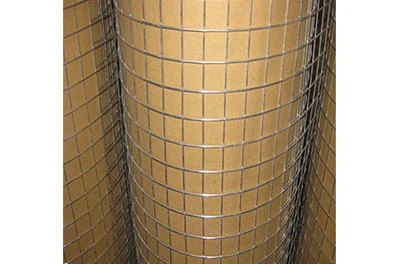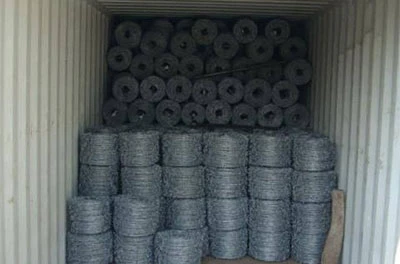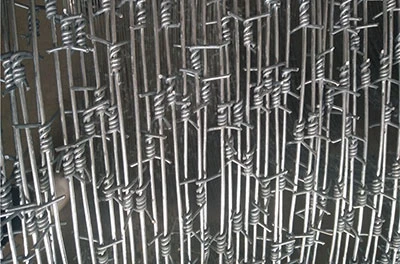Sep . 09, 2025 23:00 Back to list
Durable, Corrosion-Resistant Galvanized Welded Wire Mesh Panels
Introduction to Galvanized Welded Wire Mesh Panels
In industrial and commercial applications, the demand for durable, versatile, and corrosion-resistant materials is paramount. One such material that consistently meets these stringent requirements is the galvanized welded wire mesh panel. These panels are engineered products, combining the structural integrity of welded wire mesh with the superior protective qualities of a zinc coating. They serve as a foundational component in a myriad of sectors, from robust security fencing and animal enclosures to vital reinforcement in concrete structures and sophisticated architectural designs. Their utility stems from a combination of high tensile strength, precise mesh apertures, and an exceptional resistance to environmental degradation, making them an indispensable solution for long-term infrastructure and operational needs.
The design and manufacturing process of these panels prioritize both strength and longevity, ensuring they perform reliably in diverse and often harsh conditions. This article delves into the intricate manufacturing process, highlights key technical specifications, explores a range of application scenarios, and discusses the inherent technical advantages that position these panels as a preferred choice for discerning B2B clients and engineering professionals. We will also touch upon industry trends, customization options, and provide illustrative case studies to demonstrate their practical value.
Detailed Manufacturing Process Flow
The production of a high-quality galvanized welded wire mesh panel involves a meticulously controlled multi-stage process, ensuring optimal performance and longevity. The primary material is typically high-grade carbon steel wire, selected for its inherent strength and malleability. Below is a schematic breakdown of the manufacturing process:
1. Wire Drawing & Straightening
High-carbon steel rods are drawn through dies to achieve precise wire diameters (wire gauge). The wire is then straightened and cut to exact lengths for both warp and weft strands.
2. Electric Resistance Welding
The precisely cut wires are arranged in a grid pattern. A specialized welding machine utilizes electric resistance welding to fuse the intersecting wires at every joint. This creates a strong, consistent, and integral mesh structure, crucial for the panel's structural integrity.
3. Surface Preparation
Post-welding, the mesh panels undergo thorough cleaning, typically involving degreasing and pickling (acid bath) to remove rust, scale, and other impurities. This ensures a pristine surface for optimal zinc adhesion during galvanization.
4. Galvanization Process
The clean panels are immersed in a molten zinc bath (hot-dip galvanizing) at temperatures around 450°C. This metallurgical reaction forms a series of iron-zinc alloy layers, topped by a pure zinc layer, providing exceptional corrosion resistance. Electro-galvanizing is an alternative, offering a thinner, more uniform coating.
5. Inspection & Quality Control
Each galvanized mesh panel undergoes rigorous inspection. This includes checks for mesh aperture uniformity, wire diameter consistency, weld strength, zinc coating thickness (measured in µm or g/m²), and overall dimensional accuracy. Adherence to standards like ISO 9001, ASTM A1064/A1064M for welded wire reinforcement, and EN 10244-2 for zinc coatings is paramount.
6. Finishing & Packaging
Panels may be trimmed or further fabricated (e.g., bending) as per customer specifications. They are then carefully bundled and packaged to prevent damage during transit, ready for distribution to various industries.
The service life of a well-manufactured galvanized steel mesh panel can extend from 20 to 50 years, significantly longer than ungalvanized alternatives, especially in challenging environments. Target industries benefiting from these advantages include petrochemical for protective barriers, metallurgy for machine guarding, water supply & drainage for filtration and containment, and general construction for fencing and reinforcement. The inherent corrosion resistance and robust construction deliver energy savings through reduced maintenance and replacement costs.
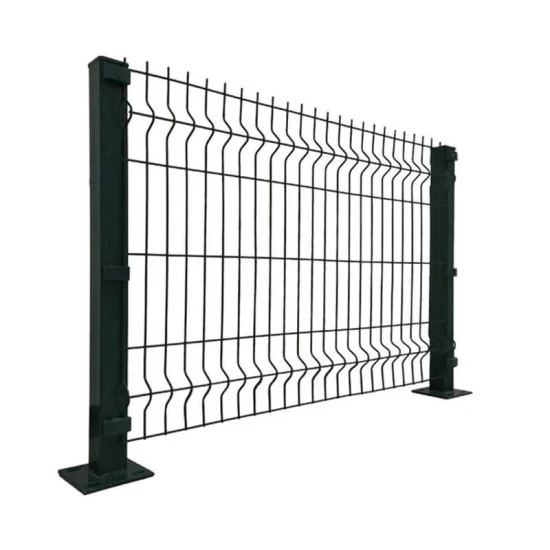
Industry Trends & Market Dynamics
The market for galvanized wire mesh panels is dynamic, driven by evolving industrial needs and technological advancements. Current trends emphasize sustainability, enhanced performance, and customization.
- Increased Demand for Sustainable Solutions: As environmental regulations tighten, the demand for materials with longer lifespans and lower environmental impact during production and end-of-life is growing. The extended durability of galvanized products reduces replacement frequency and resource consumption.
- Advanced Coatings and Alloys: Research into alternative and enhanced galvanizing processes, including zinc-aluminum alloys (Galfan, Galvalume), offers even greater corrosion resistance and extended service life, especially in highly corrosive environments. This elevates the performance of galvanized mesh panels.
- Automation in Manufacturing: The industry is witnessing greater adoption of automation and robotic welding systems to improve precision, consistency, and efficiency in producing welded mesh panels. This leads to higher quality products and reduced lead times.
- Customization and Modularization: There's a growing need for tailor-made solutions, prompting manufacturers to offer extensive customization in panel dimensions, wire gauges, mesh apertures, and post-galvanization fabrication. Modular panel systems are also gaining traction for ease of installation and adaptability.
- Digital Integration: Supply chain optimization through digital platforms, real-time inventory management, and B2B e-commerce solutions are streamlining procurement processes for large-scale projects requiring galvanized welded wire mesh panel.

Technical Specifications and Parameters
Understanding the technical specifications of galvanized welded wire mesh panels is critical for proper application and optimal performance. These parameters dictate the panel's strength, durability, and suitability for specific environments.
| Parameter | Description | Typical Range/Value | Relevant Standard |
|---|---|---|---|
| Wire Diameter (Gauge) | The thickness of the individual wires. Influences panel strength and rigidity. | 1.5 mm – 6.0 mm (16 SWG to 4 SWG) | ASTM A853, EN 10218-2 |
| Mesh Aperture (Opening Size) | The size of the square or rectangular openings between wires. Critical for flow, visibility, and containment. | 12.7x12.7mm to 200x50mm (1/2"x1/2" to 8"x2") | ISO 9044 |
| Panel Dimensions | Overall length and width of the panel. Highly customizable. | Width: 0.5m – 2.5m; Length: 1m – 6m | Client Specific |
| Zinc Coating Thickness | The layer of zinc applied for corrosion protection. Directly impacts service life. | 40-80 µm (275-550 g/m²) for Hot-dip | EN 10244-2, ASTM A123 |
| Tensile Strength | Maximum stress the wire can withstand before breaking. | 450-700 MPa | ASTM A1064, EN 10002-1 |
| Yield Strength | Stress at which the material begins to deform permanently. | 350-550 MPa | ASTM A1064, EN 10002-1 |
| Weld Shear Strength | Resistance of each weld point to shearing forces. Ensures panel integrity. | Min. 35% of wire ultimate tensile strength | ASTM A1064 |
These specifications are crucial for engineers and procurement managers when selecting the appropriate galvanized steel mesh panels for their projects. Manufacturers often provide test certificates validating these parameters, ensuring compliance with international standards and project requirements.
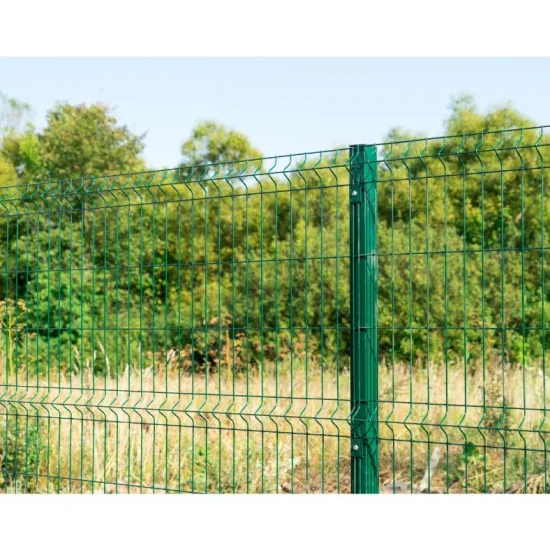
Diverse Application Scenarios
The versatility of galvanized welded wire mesh panels allows for their deployment across an extensive range of industries and applications, capitalizing on their strength, visibility, and durability.
- Security Fencing & Perimeter Protection: Ideal for industrial facilities, airports, power plants, and public areas requiring robust and anti-climb security barriers. The rigid panel format offers superior deterrence compared to rolled mesh.
- Animal Enclosures & Agricultural Applications: Used extensively for livestock fencing, poultry cages, pet enclosures, and gabion baskets for erosion control, providing durable and safe containment solutions.
- Construction & Concrete Reinforcement: Lighter gauge panels can be used as concrete reinforcement mesh in slabs, pathways, and pre-cast elements, enhancing structural integrity and preventing cracking.
- Machinery Guards & Safety Barriers: In manufacturing and processing plants, these panels form effective safety guards around machinery, preventing accidental contact while allowing visibility of operations.
- Storage & Shelving: Their inherent strength makes them excellent for industrial shelving, pallet racking inserts, and storage cages, offering secure and ventilated storage.
- Architectural & Decorative Uses: Increasingly integrated into modern architecture for facades, infill panels, balustrades, and trellises, offering a contemporary aesthetic combined with functionality.
- Landscaping & Gabion Walls: For retaining walls, riverbank protection, and decorative landscaping features, gabion baskets filled with stone and constructed from galvanized mesh panels offer both structural stability and aesthetic appeal.
The robust construction and anti-corrosion properties ensure that these panels perform reliably even in exposed outdoor environments or corrosive industrial settings.
Technical Advantages and Benefits
The widespread adoption of galvanized welded wire mesh panels across various industries is attributed to a distinct set of technical advantages that offer significant value propositions for B2B stakeholders.
- Superior Corrosion Resistance: The hot-dip galvanization process provides a robust zinc coating that acts as a sacrificial layer, protecting the underlying steel from rust and corrosion. This significantly extends the product's lifespan, especially in humid, saline, or industrial environments, reducing maintenance costs and ensuring long-term structural integrity. This is a primary differentiator for galvanized wire mesh panels.
- High Strength-to-Weight Ratio: Manufactured from high-tensile steel wire and reinforced by strong, consistent welds at every intersection, these panels offer exceptional strength and rigidity without excessive weight. This facilitates easier handling, installation, and reduces structural load on supporting frameworks.
- Enhanced Structural Stability: Unlike woven mesh, the welded intersections of a galvanized steel mesh panel ensure that the mesh pattern remains uniform and stable under stress, preventing deformation and unraveling. This is crucial for applications requiring consistent aperture size and load-bearing capacity.
- Cost-Effectiveness & Low Maintenance: While the initial investment might be slightly higher than ungalvanized alternatives, the extended service life and minimal maintenance requirements result in a significantly lower total cost of ownership over the product's lifespan. Reduced need for painting or rust treatment translates to operational savings.
- Versatility & Adaptability: Available in a vast array of wire gauges, mesh sizes, and panel dimensions, these panels can be customized to meet specific project demands. They can be cut, bent, or fabricated on-site or pre-fabricated, offering immense flexibility in design and application.
- Aesthetic Appeal: The clean, uniform appearance of galvanized mesh panels, especially with hot-dip galvanization, provides a professional and modern look, making them suitable for visible architectural and design applications.
- Resistance to Tampering: The rigid, welded structure makes it significantly harder to cut or deform these panels compared to chain link or woven mesh, enhancing their effectiveness in security applications.

Vendor Comparison: Key Differentiating Factors
Selecting the right supplier for galvanized welded wire mesh panels is crucial for project success. While many vendors offer these products, their capabilities and quality can vary significantly. A comprehensive vendor comparison should focus on several key differentiators beyond just price.
| Criterion | High-Quality Vendor Traits | Lower-Quality Vendor Risks |
|---|---|---|
| Material Sourcing & Quality | Utilizes certified high-tensile steel wire, often from reputable mills, with verifiable material test reports. | Uses lower-grade or recycled steel, leading to inconsistent strength and poor weldability. |
| Welding Precision & Strength | Employs automated welding lines with strict quality control, ensuring consistent, strong welds (meeting ASTM A1064 standards). | Manual or poorly calibrated welding, resulting in weak or inconsistent welds prone to failure. |
| Galvanization Process & Coating Thickness | Adheres to international standards (e.g., EN 10244-2, ASTM A123) for hot-dip galvanizing, ensuring uniform and specified zinc coating thickness. Provides coating test reports. | Inconsistent or thin zinc coating, leading to premature corrosion and reduced service life. May not provide verifiable test data. |
| Customization Capabilities | Offers extensive customization for wire gauge, mesh size, panel dimensions, and additional fabrication (e.g., bending, cutting). | Limited standard sizes only, inability to meet unique project specifications, or outsourced custom work. |
| Certifications & Compliance | ISO 9001 certified, adhering to relevant national and international product standards (e.g., ASTM, EN, BS). | Lack of proper quality management certifications or verifiable product standard compliance. |
| Lead Time & Logistics | Reliable lead times, efficient production capacity, and robust logistics support for timely delivery. | Frequent delays, inconsistent production schedules, and poor communication regarding shipping. |
| After-Sales Support & Warranty | Clear warranty policies, responsive customer service, and technical support for installation or issue resolution. | Ambiguous warranties, poor communication, or lack of technical assistance post-purchase. |
Reputable manufacturers prioritize consistent quality, adhere to strict testing standards, and offer comprehensive customer support. Evaluating these factors rigorously helps secure a reliable supply of high-performance galvanized welded wire mesh panel products, ensuring project longevity and client satisfaction.
Customized Solutions for Unique Requirements
Recognizing that no two projects are identical, leading manufacturers of galvanized mesh panels offer extensive customization capabilities. This flexibility ensures that clients can acquire solutions perfectly tailored to their specific technical, environmental, and aesthetic requirements.
- Tailored Dimensions: Panels can be produced in custom lengths and widths to minimize waste and streamline installation, reducing the need for on-site cutting. This is especially beneficial for large-scale projects or bespoke architectural applications.
- Variable Wire Gauges: Depending on the required load-bearing capacity, impact resistance, or security level, wire diameters can be specified from very thin to heavy-gauge wires (e.g., 2mm to 8mm or more).
- Specific Mesh Apertures: Custom mesh opening sizes (e.g., 25x25mm, 50x100mm, 75x75mm) are crucial for applications like filtration, specific animal containment, or where a particular level of visibility or airflow is required.
- Additional Fabrication: Post-galvanization, panels can be further processed. This includes:
- Bending: Panels can be supplied with specific bends or folds for architectural features, corner sections, or enhanced rigidity (e.g., 3D curved fence panels).
- Cutting & Notching: Precise cuts or notches can be made to accommodate existing structures, pipes, or other elements.
- Framing & Edging: Panels can be framed with angle iron or tubular sections for added strength, ease of installation, or a more finished appearance, creating complete galvanized steel mesh panels.
- Specialized Coatings: Beyond standard hot-dip galvanization, options like powder coating over galvanization can provide an additional layer of protection, introduce color for aesthetic purposes, or enhance resistance to specific chemicals.
- Prototyping & Design Consultation: Experienced vendors offer design and engineering support, helping clients optimize panel specifications for performance, cost-efficiency, and compliance with project standards.
This level of customization empowers architects, engineers, and project managers to achieve precise outcomes, ensuring that the galvanized welded wire mesh panel perfectly integrates into their complex designs and functional requirements.
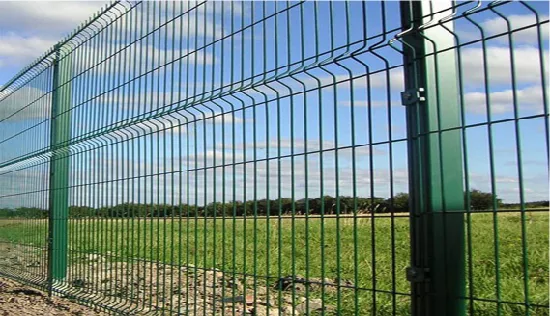
Application Case Studies
The practical application of galvanized welded wire mesh panels spans a wide array of demanding environments. Here are illustrative case studies demonstrating their effectiveness:
Case Study 1: Perimeter Security for a Coastal Industrial Complex
A major petrochemical plant located near a saline coastal environment required a high-security perimeter fence that could withstand corrosive conditions and deter unauthorized access. Traditional painted steel fencing proved to have a short service life due to rapid rust formation. The solution involved installing 3-meter high galvanized welded wire mesh panels with a 50x200mm mesh aperture and 5mm wire diameter. The panels were hot-dip galvanized to EN 10244-2 Class A standards, providing a zinc coating exceeding 600 g/m². After five years, the panels exhibited no signs of rust or degradation, significantly reducing maintenance costs and ensuring continuous, robust security. The rigidity of the panels also resisted attempts at cutting or climbing more effectively than chain link alternatives.
Case Study 2: Agricultural Livestock Containment in High-Moisture Regions
A large dairy farm in a region with high rainfall and consistent humidity needed durable enclosures for its livestock. Wooden fences rotted quickly, and ungalvanized wire mesh corroded, posing safety risks. The farm opted for galvanized mesh panels with a 75x75mm mesh and 4mm wire diameter. The panels were easy to install with standard fence posts and offered excellent visibility for monitoring livestock. The thick zinc coating provided by the hot-dip galvanizing process proved highly effective against the wet conditions and animal waste, extending the fence lifespan to over 20 years with minimal repair, far exceeding previous solutions.
Case Study 3: Concrete Reinforcement for a Public Walkway Project
In a municipal project to construct new pedestrian walkways and cycle paths, engineers sought a durable and crack-resistant concrete solution. They specified the use of galvanised steel mesh panels as welded wire reinforcement (WWR) within the concrete slabs. Panels measuring 2.4x4.8 meters with a 150x150mm mesh aperture and 6mm wire diameter were chosen. The galvanized finish provided added protection against potential moisture ingress and corrosion of the steel reinforcement, a common issue in outdoor concrete. The pre-fabricated panels significantly sped up the installation process compared to laying individual rebar, contributing to project efficiency and ensuring long-term structural integrity of the public infrastructure.

Frequently Asked Questions (FAQ)
Q1: What is the primary advantage of galvanized welded wire mesh panels over plain steel mesh?
A1: The primary advantage is superior corrosion resistance. The zinc coating applied during galvanization acts as a protective barrier and a sacrificial anode, preventing rust and significantly extending the service life of the panel, especially in outdoor or harsh environments, making galvanized mesh panels a more durable choice.
Q2: How is "wire gauge" related to the strength of the panel?
A2: Wire gauge refers to the diameter of the individual wires. A lower gauge number indicates a thicker wire, which translates to greater tensile strength, rigidity, and overall durability of the galvanized welded wire mesh panel. Thicker wires are typically used for applications requiring higher load-bearing capacity or enhanced security.
Q3: Can these panels be customized for specific project requirements?
A3: Absolutely. Leading manufacturers offer extensive customization options, including specific panel dimensions (length and width), wire gauges, mesh apertures (opening sizes), and even post-galvanization fabrication like bending, cutting, or framing. This ensures the galvanized steel mesh panel perfectly fits unique project specifications.
Q4: What is the typical lead time for an order of galvanized wire mesh panels?
A4: Lead times can vary depending on the order volume, customization complexity, and current production schedule. For standard panels, it might be 2-4 weeks. Highly customized or very large orders could require 4-8 weeks. It's best to consult directly with the supplier for precise lead time estimates at the time of inquiry.
Q5: What kind of warranty or after-sales support is typically provided?
A5: Reputable manufacturers usually offer a warranty against manufacturing defects and premature corrosion under normal use, often ranging from 10 to 25 years for the galvanization. Comprehensive after-sales support includes technical assistance for installation, guidance on maintenance, and responsive handling of any product-related inquiries or issues.
Lead Time, Fulfillment, and Warranty Commitments
Lead Time & Fulfillment
Our commitment to efficiency and reliability ensures that clients receive their galvanized welded wire mesh panel orders in a timely manner. Typical lead times for standard stock items range from 2 to 3 weeks from order confirmation. For customized specifications, including unique dimensions, wire gauges, or mesh sizes, lead times generally extend to 4 to 6 weeks, allowing for specialized production runs and rigorous quality checks. We maintain a robust inventory of common wire diameters and mesh sizes to expedite urgent orders. Our fulfillment process includes stringent quality control at every stage, from material sourcing to final packaging, ensuring products arrive in optimal condition. We collaborate with trusted logistics partners to provide reliable global shipping solutions, offering clear communication and tracking from dispatch to delivery.
Warranty Commitments
We stand behind the quality and durability of our galvanized mesh panels. All products are backed by a comprehensive warranty:
- Galvanization Warranty: We offer a minimum 10-year warranty against premature corrosion or significant degradation of the zinc coating under normal environmental conditions for hot-dip galvanized panels, often extending to 20 years in less aggressive environments. This covers any failure of the protective coating attributed to manufacturing defects.
- Structural Integrity Warranty: A 5-year warranty is provided against manufacturing defects affecting the structural integrity of the welded joints or overall panel construction of the galvanized wire mesh panels, ensuring they maintain their specified form and function.
Customer Support Information
Our dedicated customer support team is available to assist with any inquiries, technical specifications, order status updates, or after-sales service needs. We offer:
- Technical Consultation: Expert advice on product selection, application suitability, and compliance with industry standards.
- Responsive Communication: Prompt replies to emails and phone calls, ensuring you receive timely assistance.
- Issue Resolution: Efficient handling of any claims or issues, striving for swift and satisfactory resolutions.
Our goal is to foster long-term partnerships by providing not just high-quality galvanised steel mesh panels but also unparalleled service and support throughout the entire project lifecycle.

References
- ASTM A1064/A1064M-17. Standard Specification for Carbon-Steel Wire and Welded Wire Reinforcement, Plain and Deformed, for Concrete. ASTM International, West Conshohocken, PA.
- EN 10244-2:2009. Steel wire and wire products - Non-ferrous metallic coatings on steel wire - Part 2: Zinc or zinc alloy coatings. British Standards Institution.
- ISO 9001:2015. Quality management systems - Requirements. International Organization for Standardization.
- International Zinc Association. Hot-Dip Galvanizing: A Guide to Process, Properties, and Applications.
- NACE International. Corrosion Basics: An Introduction.
Introduction to Galvanized Welded Wire Mesh Panels
In industrial and commercial applications, the demand for durable, versatile, and corrosion-resistant materials is paramount. One such material that consistently meets these stringent requirements is the galvanized welded wire mesh panel. These panels are engineered products, combining the structural integrity of precisely welded wire mesh with the superior protective qualities of a zinc coating. They serve as a foundational component in a myriad of sectors, from robust security fencing and animal enclosures to vital reinforcement in concrete structures and sophisticated architectural designs. Their utility stems from a combination of high tensile strength, precise mesh apertures, and an exceptional resistance to environmental degradation, making them an indispensable solution for long-term infrastructure and operational needs in demanding B2B environments.
The design and manufacturing process of these panels prioritize both strength and longevity, ensuring they perform reliably in diverse and often harsh conditions. This article delves into the intricate manufacturing process, highlights key technical specifications, explores a range of application scenarios, and discusses the inherent technical advantages that position these panels as a preferred choice for discerning B2B clients and engineering professionals. We will also touch upon current industry trends, customization options, and provide illustrative case studies to demonstrate their practical value, reinforcing trust and authority through data-driven insights.
Detailed Manufacturing Process Flow
The production of a high-quality galvanized welded wire mesh panel involves a meticulously controlled multi-stage process, ensuring optimal performance and longevity. The primary material is typically high-grade carbon steel wire, selected for its inherent strength and malleability. Below is a schematic breakdown of the manufacturing process, emphasizing key steps and quality control measures:
1. Wire Drawing & Straightening
High-carbon steel rods, conforming to standards such as ASTM A853 or EN 10218-2, are drawn through a series of dies to achieve precise wire diameters (wire gauge). These wires are then precisely straightened and cut to specified lengths for both longitudinal (warp) and transverse (weft) strands, ensuring dimensional accuracy for the subsequent welding stage.
2. Electric Resistance Welding
The precisely cut wires are arranged in a perfect orthogonal grid pattern. A specialized automated welding machine utilizes electric resistance welding, applying precise heat and pressure to fuse the intersecting wires at every joint. This creates a strong, consistent, and integral mesh structure with high weld shear strength, crucial for the panel's structural integrity and adherence to standards like ASTM A1064 for welded wire reinforcement.
3. Surface Preparation (Cleaning & Pickling)
Post-welding, the mesh panels undergo thorough surface preparation. This typically involves degreasing to remove oils and lubricants, followed by pickling in an acid bath (e.g., hydrochloric acid) to remove rust, mill scale, and other surface impurities. Proper surface preparation is critical to ensure a pristine and reactive steel surface for optimal zinc adhesion during galvanization, preventing coating failures.
4. Galvanization Process
The clean, fluxed panels are immersed in a molten zinc bath (hot-dip galvanizing) maintained at temperatures typically around 450°C (840°F). During this process, a metallurgical reaction occurs, forming a series of iron-zinc alloy layers, topped by a pure zinc layer. This robust, continuous coating provides exceptional cathodic and barrier corrosion resistance, adhering to standards such as EN 10244-2 or ASTM A123. Electro-galvanizing, which offers a thinner, more uniform coating, is an alternative for less aggressive environments.
5. Inspection & Quality Control
Each galvanized mesh panel undergoes rigorous inspection to ensure adherence to specified parameters and international testing standards. This includes checks for mesh aperture uniformity, wire diameter consistency, weld strength, zinc coating thickness (measured in µm or g/m²), and overall dimensional accuracy. Compliance with ISO 9001 quality management systems is maintained throughout the process, ensuring product reliability and performance.
6. Finishing & Packaging
Following inspection, panels may undergo further fabrication such as trimming, bending, or cutting to meet specific customer designs. They are then carefully bundled, often using steel strapping or protective wrapping, and packaged to prevent damage during transit and storage. This final stage ensures that the finished galvanized welded wire mesh panel arrives at the client's site ready for immediate deployment.
The service life of a well-manufactured galvanized steel mesh panel can extend from 20 to 50 years, significantly longer than ungalvanized alternatives, especially in challenging environments. Target industries benefiting from these advantages include petrochemical for protective barriers, metallurgy for machine guarding, water supply & drainage for filtration and containment, and general construction for fencing and reinforcement. The inherent corrosion resistance and robust construction deliver energy savings through reduced maintenance and replacement costs.

Industry Trends & Market Dynamics
The market for galvanized wire mesh panels is dynamic, driven by evolving industrial needs, technological advancements, and a growing emphasis on sustainability. Current trends are shaping the future of specification and procurement:
- Increased Demand for Sustainable Solutions: As environmental regulations tighten globally, the demand for materials with longer lifespans and lower embodied energy during their lifecycle is growing. The extended durability of galvanized products reduces replacement frequency and resource consumption, aligning with circular economy principles.
- Advanced Coatings and Alloys: Research and development are continuously exploring alternative and enhanced galvanizing processes, including zinc-aluminum alloy coatings (e.g., Galfan, Galvalume). These advanced coatings offer even greater corrosion resistance and extended service life, particularly in highly corrosive or aggressive environments, elevating the performance of galvanized mesh panels in specialized applications.
- Automation and AI in Manufacturing: The industry is witnessing greater adoption of automation and robotic welding systems to improve precision, consistency, and efficiency in producing welded mesh panels. This not only leads to higher quality products with tighter tolerances but also reduces labor costs and enhances production scalability.
- Customization and Modularization: There's a growing need for tailor-made solutions, prompting manufacturers to offer extensive customization in panel dimensions, wire gauges, mesh apertures, and post-galvanization fabrication. Modular panel systems are also gaining traction for ease of installation, adaptability to various site conditions, and reduced on-site labor.
- Digital Integration and Supply Chain Optimization: The adoption of digital platforms for supply chain management, real-time inventory tracking, and B2B e-commerce solutions is streamlining procurement processes. This allows for more efficient sourcing and delivery of galvanized welded wire mesh panel products for large-scale infrastructure projects.
- Emphasis on Safety and Compliance: With stricter workplace safety regulations, the use of robust and certified mesh panels for machine guarding, safety barriers, and fall protection is increasingly mandated, driving demand for high-quality, compliant products.

Technical Specifications and Parameters
Understanding the technical specifications of galvanized welded wire mesh panels is critical for proper application design and optimal performance. These parameters dictate the panel's strength, durability, and suitability for specific environments. Detailed measurement and testing ensure compliance with project requirements.
| Parameter | Description & Impact | Typical Range/Value | Relevant Standard |
|---|---|---|---|
| Wire Diameter (Gauge) | The thickness of individual wires. Directly influences panel strength, rigidity, and resistance to deformation. A lower gauge number implies a thicker wire. | 1.5 mm – 6.0 mm (approx. 16 SWG to 4 SWG) | ASTM A853, EN 10218-2 |
| Mesh Aperture (Opening Size) | The precise dimensions of the square or rectangular openings between wires. Critical for factors like visibility, airflow, containment capabilities, and anti-climb properties. | 12.7x12.7mm to 200x50mm (e.g., 1/2"x1/2" to 8"x2") | ISO 9044 |
| Panel Dimensions | Overall length and width of the fabricated panel. These are highly customizable to minimize on-site cutting and waste. | Width: 0.5m – 2.5m; Length: 1m – 6m (customizable) | Client Specific Drawings |
| Zinc Coating Thickness | The thickness of the protective zinc layer. Directly impacts the panel's corrosion resistance and expected service life in various atmospheric conditions. | 40-80 µm (approx. 275-550 g/m²) for Hot-dip | EN 10244-2, ASTM A123 |
| Tensile Strength | The maximum stress the steel wire can withstand before it begins to fracture. A critical indicator of the panel's load-bearing capacity and resistance to pulling forces. | 450-700 MPa | ASTM A1064, EN 10002-1 |
| Yield Strength | The stress at which the wire begins to deform permanently without increasing the load. Important for structural design, preventing plastic deformation under service loads. | 350-550 MPa | ASTM A1064, EN 10002-1 |
| Weld Shear Strength | The resistance of each welded intersection point to shearing forces. Ensures the integral stability of the mesh panel and prevents individual wires from separating under stress. | Min. 35% of wire ultimate tensile strength | ASTM A1064 |
These specifications are crucial for engineers and procurement managers when selecting the appropriate galvanized steel mesh panels for their projects. Reputable manufacturers provide test certificates validating these parameters, ensuring compliance with international standards and project requirements. Data-driven material selection is vital for project longevity and safety.

Diverse Application Scenarios
The versatility of galvanized welded wire mesh panels allows for their deployment across an extensive range of industries and applications, capitalizing on their strength, visibility, and inherent durability. Their robust nature makes them ideal for environments requiring long-term performance and minimal maintenance.
- Security Fencing & Perimeter Protection: Employed for industrial facilities, airports, data centers, power plants, and critical infrastructure requiring robust, anti-climb security barriers. The rigid panel format, often with small mesh apertures, offers superior deterrence and resistance to cutting compared to rolled mesh.
- Animal Enclosures & Agricultural Applications: Used extensively for livestock fencing, poultry cages, pet enclosures, and zoo exhibits. They provide durable, safe, and escape-proof containment solutions, capable of withstanding agricultural environments.
- Construction & Concrete Reinforcement: Lighter gauge panels are widely used as welded wire reinforcement (WWR) in concrete slabs, foundations, pathways, and pre-cast concrete elements, enhancing structural integrity and significantly reducing the likelihood of cracking due to thermal expansion and contraction.
- Machinery Guards & Safety Barriers: In manufacturing, processing plants, and heavy industry, these panels form effective safety guards around dangerous machinery, conveyor belts, and robotic cells. They prevent accidental contact while allowing clear visibility of operations and promoting a safe working environment.
- Storage & Shelving Systems: Their inherent strength and uniform mesh make them excellent for industrial shelving, pallet rack decking, warehouse partition walls, and secure storage cages, offering ventilated and visible storage solutions.
- Architectural & Decorative Uses: Increasingly integrated into modern architecture for building facades, infill panels for stairways and balconies, balustrades, and elaborate trellises. They offer a contemporary aesthetic, allowing for light and air penetration while providing robust functionality.
- Gabion Walls & Erosion Control: For civil engineering and landscaping, gabion baskets constructed from heavy-gauge galvanized mesh panels, filled with rocks, are used for retaining walls, riverbank protection, sound barriers, and decorative landscape features. They offer structural stability, flexibility, and permeability.
- Walkways & Grating: In certain industrial settings, particularly with heavier wire gauges, these panels can serve as robust and slip-resistant grating for elevated walkways, platforms, and trench covers.
The robust construction and anti-corrosion properties of galvanized mesh panels ensure they perform reliably even in exposed outdoor environments or highly corrosive industrial settings, making them a cornerstone material for diverse applications.

Technical Advantages and Benefits
The widespread adoption of galvanized welded wire mesh panels across various industries is attributed to a distinct set of technical advantages that offer significant value propositions for B2B stakeholders, including engineers, procurement managers, and project developers.
- Superior Corrosion Resistance: The hot-dip galvanization process provides a robust zinc coating that acts as both a physical barrier and a sacrificial anode. This dual protection mechanism effectively prevents rust and corrosion of the underlying steel, significantly extending the product's lifespan, especially in humid, saline, or aggressive industrial environments. This is a primary differentiator for galvanized mesh panels, leading to substantial long-term savings.
- High Strength-to-Weight Ratio: Manufactured from high-tensile steel wire and reinforced by strong, consistent welds at every intersection, these panels offer exceptional strength and rigidity without excessive weight. This inherent property facilitates easier handling and installation, reduces structural load on supporting frameworks, and maintains performance under significant stress.
- Enhanced Structural Stability: Unlike woven mesh, where wires can shift or unravel, the electrically welded intersections of a galvanized steel mesh panel create a rigid, integral structure. This ensures that the mesh pattern remains uniform and stable under various loads and impacts, preventing deformation and maintaining consistent aperture sizes, which is crucial for filtration, security, and reinforcement applications.
- Cost-Effectiveness & Low Maintenance: While the initial investment for galvanized products might be marginally higher than for ungalvanized alternatives, the extended service life (often 20-50 years) and minimal maintenance requirements result in a significantly lower total cost of ownership (TCO). Reduced need for painting, rust treatment, or premature replacement translates directly into operational savings and improved budget predictability.
- Versatility & Adaptability: Available in a vast array of wire gauges, mesh sizes, and panel dimensions, these panels can be readily customized to meet highly specific project demands. They can be precisely cut, bent, or fabricated on-site or pre-fabricated to complex designs, offering immense flexibility in design and application across diverse industries.
- Aesthetic Appeal: The clean, uniform appearance of hot-dip galvanized mesh panels provides a professional and modern look. This makes them suitable not only for functional industrial applications but also increasingly for visible architectural and design elements where both durability and visual quality are paramount.
- Resistance to Tampering and Impact: The rigid, welded structure and robust wire diameters make it significantly harder to cut, deform, or breach these panels compared to more flexible alternatives like chain link or woven mesh, greatly enhancing their effectiveness in security and protective barrier applications.

Vendor Comparison: Key Differentiating Factors
Selecting the right supplier for galvanized welded wire mesh panels is crucial for project success and long-term asset performance. While many vendors offer these products, their capabilities, quality control, and overall value proposition can vary significantly. A comprehensive vendor comparison should focus on several key differentiators beyond just the initial price.
| Criterion | High-Quality Vendor Traits | Lower-Quality Vendor Risks |
|---|---|---|
| Material Sourcing & Quality | Utilizes certified high-tensile steel wire from reputable mills (e.g., meeting ASTM A853), with readily available material test reports (MTRs) for full traceability. | Uses lower-grade or inconsistent quality steel, potentially recycled, leading to unpredictable strength, poor weldability, and a lack of verifiable material documentation. |
| Welding Precision & Strength | Employs advanced automated welding lines with stringent quality control, ensuring consistent, strong, and defect-free welds (meeting or exceeding ASTM A1064 weld shear strength requirements). | Relies on manual or poorly calibrated welding equipment, resulting in weak, inconsistent welds prone to fracture, leading to panel failure under stress or impact. |
| Galvanization Process & Coating Thickness | Adheres strictly to international standards (e.g., EN 10244-2, ASTM A123) for hot-dip galvanizing, guaranteeing uniform and specified zinc coating thickness across all surfaces. Provides verifiable coating test reports. | Inconsistent or thin zinc coating due to uncontrolled process parameters, leading to premature corrosion, reduced service life, and an inability to provide reliable coating thickness data. |
| Customization Capabilities | Offers extensive customization for wire gauge, mesh size, panel dimensions, and additional fabrication (e.g., precise bending, laser cutting, integrated framing) to meet unique project specifications. | Limited to standard, off-the-shelf sizes and configurations, inability to meet unique project requirements, or high costs for minimal customization. |
| Certifications & Compliance | ISO 9001 certified, demonstrating a robust quality management system. Products comply with relevant national and international standards (e.g., ASTM, EN, BS) with traceable documentation. | Lack of proper quality management certifications, ambiguous claims of compliance, or inability to provide verifiable product standard adherence for their galvanized steel mesh panels. |
| Lead Time & Logistics | Provides reliable and transparent lead times, possesses efficient production capacity, and offers robust logistics support for timely and secure delivery to site, including international shipping expertise. | Frequent production delays, inconsistent communication regarding order status, and unreliable shipping that leads to project setbacks and cost overruns. |
| After-Sales Support & Warranty | Offers clear, comprehensive warranty policies (e.g., 10-20 years for galvanization), responsive customer service, and readily available technical support for installation guidance or issue resolution. | Ambiguous or short warranty periods, poor communication, or a lack of technical assistance post-purchase, leaving clients unsupported if issues arise. |
Reputable manufacturers prioritize consistent quality, adhere to strict testing standards, and offer comprehensive customer support, understanding that the performance of a galvanized welded wire mesh panel directly impacts project success and safety. Evaluating these factors rigorously helps procurement professionals secure a reliable supply of high-performance products, ensuring project longevity and client satisfaction.
Customized Solutions for Unique Requirements
Recognizing that no two projects are identical, leading manufacturers of galvanized mesh panels offer extensive customization capabilities. This flexibility ensures that clients can acquire solutions perfectly tailored to their specific technical, environmental, aesthetic, and budgetary requirements, optimizing performance and cost-efficiency.
- Tailored Dimensions: Panels can be produced in custom lengths and widths to minimize on-site cutting, reduce material waste, and streamline installation. This is especially beneficial for large-scale infrastructure projects, bespoke architectural applications, or when fitting into existing frameworks.
- Variable Wire Gauges: Depending on the required load-bearing capacity, impact resistance, or security level, wire diameters can be specified across a wide range, from fine gauges for decorative uses to heavy-duty gauges (e.g., 2mm to 8mm or more) for high-security fencing or robust machine guarding.
- Specific Mesh Apertures: Custom mesh opening sizes (e.g., 12.7x12.7mm, 50x100mm, 75x75mm, or rectangular configurations) are crucial for applications like precise filtration, specific animal containment, or where a particular level of visibility, airflow, or anti-climb property is required.
- Additional Fabrication & Forming: Beyond standard flat panels, specialized fabrication capabilities allow for complex shapes and forms, including:
- Bending & Forming: Panels can be supplied with specific bends, curves, or folds for architectural features, corner sections, or enhanced rigidity (e.g., 3D curved fence panels for aesthetics and strength).
- Precision Cutting & Notching: Advanced CNC cutting allows for precise cuts, holes, or notches to accommodate existing structures, pipes, conduit, or other integrated elements.
- Framing & Edging: Panels can be pre-framed with angle iron, tubular sections, or flat bars for added strength, ease of installation, or a more finished appearance, transforming them into complete modular units.
- Specialized Coatings: Beyond standard hot-dip galvanization, options like duplex systems (powder coating over galvanization) can provide an additional layer of protection, introduce specific colors for branding or aesthetic purposes, or enhance resistance to particular chemicals or UV exposure.
- Prototyping & Design Consultation: Experienced vendors offer comprehensive design and engineering support. This includes 3D modeling, stress analysis, and prototyping services, helping clients optimize panel specifications for performance, cost-efficiency, and compliance with project standards from conception to completion.
This level of customization empowers architects, engineers, and project managers to achieve precise outcomes, ensuring that the galvanized welded wire mesh panel perfectly integrates into their complex designs and functional requirements, delivering optimal project value.

Application Case Studies
The practical application of galvanized welded wire mesh panels spans a wide array of demanding environments, showcasing their adaptability and robust performance. These real-world examples illustrate the tangible benefits derived from their unique properties.
Case Study 1: High-Security Perimeter Fencing for a Coastal Industrial Complex
A major petrochemical plant, critically located near a saline coastal environment, required a high-security perimeter fence that could withstand highly corrosive atmospheric conditions and effectively deter unauthorized access. Traditional painted steel fencing proved to have a short service life due to rapid rust formation, necessitating frequent and costly maintenance. The selected solution involved installing 3-meter high galvanized welded wire mesh panels with a tight 50x200mm mesh aperture and a robust 5mm wire diameter. The panels underwent hot-dip galvanization to EN 10244-2 Class A standards, providing a zinc coating exceeding 600 g/m². After five years of continuous exposure, the panels exhibited no signs of rust or degradation, significantly reducing maintenance costs and ensuring continuous, robust security. The inherent rigidity of the panels also proved more effective in resisting attempts at cutting or climbing compared to conventional chain link alternatives, enhancing the overall security posture of the facility.
Case Study 2: Agricultural Livestock Containment in High-Moisture Regions
A large commercial dairy farm situated in a region characterized by high rainfall and consistent humidity faced significant challenges with fence longevity. Wooden fences rotted quickly, and ungalvanized wire mesh corroded prematurely, posing safety risks to livestock and requiring constant repair. The farm opted for a large-scale deployment of galvanized mesh panels with a 75x75mm mesh and a durable 4mm wire diameter. These panels were found to be exceptionally easy to install with standard fence posts and offered excellent visibility for monitoring livestock. The thick, uniformly applied zinc coating, achieved through the hot-dip galvanizing process, proved highly effective against the corrosive effects of the wet climate and agricultural waste. This solution extended the fence lifespan to over 20 years with minimal repair requirements, far exceeding the performance and cost-efficiency of previous containment systems.
Case Study 3: Concrete Reinforcement for a Public Walkway and Cycle Path Project
In a municipal infrastructure project aimed at constructing new pedestrian walkways and cycle paths, civil engineers sought a durable and crack-resistant concrete solution that would require minimal maintenance over decades. They specified the innovative use of galvanised steel mesh panels as welded wire reinforcement (WWR) within the concrete slabs. Panels measuring 2.4x4.8 meters with a 150x150mm mesh aperture and a 6mm wire diameter were chosen for their optimal balance of strength and flexibility. The galvanized finish provided an essential added layer of protection against potential moisture ingress and the subsequent corrosion of the steel reinforcement, a common issue leading to concrete deterioration in outdoor applications. The pre-fabricated nature of the panels significantly streamlined the installation process compared to traditional rebar placement, contributing to project efficiency, reducing labor costs, and ensuring the long-term structural integrity and longevity of the public infrastructure.

Frequently Asked Questions (FAQ)
Q1: What is the primary advantage of galvanized welded wire mesh panels over plain steel mesh?
A1: The primary advantage is superior corrosion resistance. The zinc coating applied during galvanization acts as a protective barrier and a sacrificial anode, preventing rust and significantly extending the service life of the panel, especially in outdoor or harsh environments. This makes galvanized mesh panels a more durable and cost-effective long-term solution.
Q2: How does "wire gauge" relate to the strength and application of the panel?
A2: Wire gauge refers to the diameter of the individual wires. A lower gauge number indicates a thicker wire, which translates to greater tensile strength, rigidity, and overall durability of the galvanized welded wire mesh panel. Thicker wires are typically used for applications requiring higher load-bearing capacity, enhanced security, or greater impact resistance, while thinner gauges may be suitable for light architectural or screening purposes.
Q3: Can these panels be customized for specific project requirements?
A3: Absolutely. Leading manufacturers offer extensive customization options, including specific panel dimensions (length and width), wire gauges, mesh apertures (opening sizes), and even post-galvanization fabrication like bending, precise cutting, or integrated framing. This ensures the galvanized steel mesh panel perfectly fits unique project specifications, minimizing waste and optimizing functionality.
Q4: What is the typical lead time for an order of galvanized wire mesh panels, and how does it impact project planning?
A4: Lead times can vary depending on the order volume, customization complexity, and current production schedule. For standard stock panels, typical lead times are 2-3 weeks. Highly customized or very large orders could require 4-8 weeks. It's crucial for project managers to consult directly with the supplier for precise lead time estimates at the time of inquiry to ensure seamless integration into the project timeline and prevent delays.
Q5: What kind of warranty or after-sales support is typically provided for these industrial products?
A5: Reputable manufacturers typically offer a robust warranty against manufacturing defects and premature corrosion under normal use, often ranging from 10 to 25 years for the galvanization coating. Comprehensive after-sales support includes technical assistance for installation guidance, expert advice on maintenance best practices, and responsive handling of any product-related inquiries or issues to ensure long-term client satisfaction and product performance.
Lead Time, Fulfillment, and Warranty Commitments
Lead Time & Fulfillment
Our commitment to efficiency and reliability ensures that clients receive their galvanized welded wire mesh panel orders in a timely manner, minimizing project delays and optimizing operational schedules. Typical lead times for standard stock items range from 2 to 3 weeks from official order confirmation. For customized specifications, including unique panel dimensions, specialized wire gauges, or complex mesh sizes, lead times generally extend to 4 to 6 weeks, allowing for meticulous specialized production runs, rigorous quality checks, and any required additional fabrication. We strategically maintain a robust inventory of common wire diameters and mesh sizes to facilitate expedited delivery for urgent requirements. Our comprehensive fulfillment process includes stringent quality control at every stage, from raw material sourcing to final packaging, ensuring that all products arrive in optimal condition. We collaborate with trusted global logistics partners to provide reliable shipping solutions, offering clear communication and tracking from dispatch to final delivery, ensuring smooth supply chain integration.
Warranty Commitments
We stand firmly behind the quality, durability, and performance of our galvanized mesh panels. All products are backed by a comprehensive warranty designed to provide peace of mind and secure your investment:
- Galvanization Warranty: We offer a minimum 10-year warranty against premature corrosion or significant degradation of the zinc coating under normal environmental conditions for our hot-dip galvanized panels. This warranty can often extend to 20 years in less aggressive or controlled environments, depending on the specified coating thickness and application. This commitment covers any failure of the protective coating attributed to manufacturing defects.
- Structural Integrity Warranty: A robust 5-year warranty is provided against manufacturing defects affecting the structural integrity of the welded joints or the overall panel construction of the galvanized wire mesh panels. This ensures that the panels maintain their specified form, rigidity, and functional performance under normal operational loads and conditions.
Customer Support Information
Our dedicated customer support team is available to assist with any inquiries, technical specifications, order status updates, or after-sales service needs. We are committed to providing expert assistance and ensuring a seamless experience for all our B2B partners. Our support services include:
- Technical Consultation: Access to our team of experts for in-depth advice on product selection, application suitability, compliance with industry standards, and engineering challenges.
- Responsive Communication: We guarantee prompt and detailed replies to emails and phone calls, ensuring you receive timely assistance and information to keep your projects on track.
- Efficient Issue Resolution: A streamlined process for handling any warranty claims or product-related issues, striving for swift and satisfactory resolutions to minimize disruption to your operations.
Our goal is to foster long-term, trusted partnerships by consistently delivering not just high-quality galvanised steel mesh panels but also unparalleled service and comprehensive support throughout the entire project lifecycle, reinforcing our commitment to client success.

References
- ASTM A1064/A1064M-17. Standard Specification for Carbon-Steel Wire and Welded Wire Reinforcement, Plain and Deformed, for Concrete. ASTM International, West Conshohocken, PA.
- EN 10244-2:2009. Steel wire and wire products - Non-ferrous metallic coatings on steel wire - Part 2: Zinc or zinc alloy coatings. British Standards Institution (BSI).
- ISO 9001:2015. Quality management systems - Requirements. International Organization for Standardization (ISO).
- International Zinc Association. Hot-Dip Galvanizing: A Guide to Process, Properties, and Applications. Retrieved from: https://www.zinc.org/markets/galvanizing/hot-dip/
- NACE International. Corrosion Basics: An Introduction. NACE Press.
- "The Advantages of Welded Wire Mesh in Construction," Construction Review Online, 2023.
Latest News
-
Durable and Custom Metal Grid for Drainage Solutions | Chengsen Mesh
NewsNov.24,2025
-
Durable Metal Drain Grill Solutions | Urban & Industrial Drainage Experts
NewsNov.23,2025
-
Hinged Grating: Durable, Safe, and Efficient Infrastructure Access Solutions
NewsNov.22,2025
-
What Is a Grating Wall? Benefits, Uses & Industry Trends Explained
NewsNov.21,2025
-
Durable and Customizable Grating Stainless for Industrial & Infrastructure Needs
NewsNov.20,2025
-
Grating Plumbing: Durable & Efficient Drainage Solutions For Modern Infrastructure
NewsNov.20,2025
Our company owns has excellent CAD steel grating drawing designers, who can provide customers with perfect steel grating layout design and better meet customers' special requirements for products. We have been adhering to it the business tenet of "quality first, customer first", with high-quality products, reasonable prices, and the fastest delivery time, we wholeheartedly provide customers with a full range of services! Welcome new and old customers to cooperate sincerely and create brilliance together!
Contact Us
WELCOME TO OUR COMPANY!
Thank you for your interest in our services! If you have any questions or wousld like to book a service, please don’t hesitate to contact us. Our team is dedicated to providing you with the highest level of service and support, and we are committed to working with you to make your event a success.

Service Email

Service Phone
Product Center
Contact Us
- Phone: +86 +86 15733154345
- E-mail: sales@chengsenchina.com
- Address: B1213 GLOBAL CENTER, NO.226 ZHONGHUA NORTH STREET, SHIJIAHUANG, CHINA


